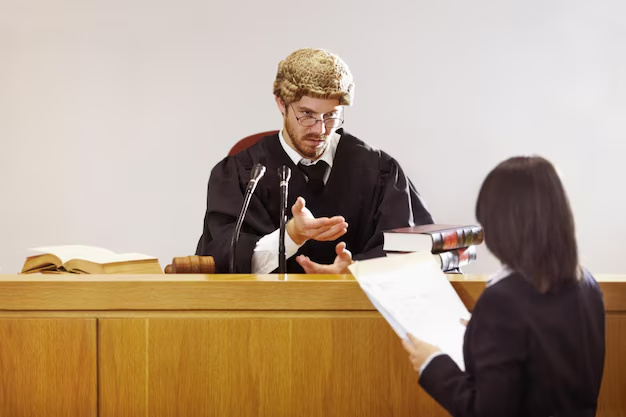Do Celebrities Really Serve Jury Duty? Unveiling the Truth and Myth
In the glamorized world of celebrities, where spotlights often follow their every move, a question arises that piques public curiosity: Do celebrities get called for jury duty? The concept of a famous face sitting among ordinary citizens in a jury box is both amusing and intriguing. Dive into the rules surrounding jury duty and discover whether the rich and famous are truly not immune to this civic responsibility normally governing ordinary citizens.
⭐ Celebrity Jury Duty: Fact or Fiction?
First and foremost, jury duty is an obligation of citizenship in many countries, including the United States. It’s a crucial pillar of the judicial system, ensuring fair trial rights. But does this civic necessity exempt celebrities? The simple answer is no; celebrities are not automatically exempt from jury duty. They receive summons like any other citizen and are expected to appear unless they have a valid exemption or reason to defer.
📜 The Legal Reality
Celebrities are citizens first. Regardless of fame or status, the legal obligations remain the same. Jurisdictional rules don’t differentiate based on personal wealth or public recognition. Celebrities, like everyone else, can be summoned for jury duty if they meet the following criteria:
- They are of legal age (usually 18 years or older).
- They are residents in the county or district where the court is located.
- They have no disqualifying criminal record prohibiting jury service.
Celebrities who receive a summons must respond and appear unless they qualify for standard exemptions, which leads to questions about how they participate practically given their public profiles.
🎬 Celebrities Who Served Jury Duty
While it may seem improbable, numerous celebrities have indeed served on a jury. Here are a few instances:
- Tom Hanks participated in a domestic violence case in Los Angeles, earning praise for demonstrating civic duty despite his busy schedule.
- Oprah Winfrey served on a murder trial jury in Chicago, showcasing her commitment to the judicial process.
- Ed Norton was involved in a fraud case in New York, further highlighting how celebrities actively partake in civic responsibilities.
These examples underlie the reality that celebrities can and do serve, balancing their public life with the duties of a citizen.
🤔 Why Are Celebrities Often Absent?
Despite a handful of celebrities serving, many perceive that celebrities don't participate in jury duty. Several factors contribute to this perception:
Scheduling conflicts: Celebrities often have tight, inflexible schedules with shoots or performances. Courts occasionally accommodate deferrals or rescheduling within reason.
Public distraction: A celebrity's presence could overshadow a case, potentially affecting the focus and fairness. Often, lawyers seek to exclude high-profile jurors to maintain neutrality.
Security concerns: Increased security measures can be disruptive and costly. Courts balance participation with logistical feasibility, sometimes resulting in dismissals.
📊 Navigating Jury Duty Logistics
How Jury Duty Works for Celebrities
The jury selection process, known as voir dire, involves screening potential jurors to eliminate biases. During this process, attorneys may challenge seats for cause or use peremptory challenges, often excluding high-profile individuals whose celebrity might distract or influence other jurors. Here’s how the process includes celebrities:
- Summons is issued: Like any resident, they receive a summons via mail.
- Response required: Celebrities respond to the summons. Ignoring can result in legal consequences, including fines.
- Potential exemptions or rescheduling: They can request deferrals due to work commitments or personal situations, subject to approval.
- Voir dire participation: They attend jury selection where attorneys evaluate for potential biases or conflicts.
Exemptions and Valid Deferrals
Celebrities may seek deferrals based on legitimate work conflicts, health issues, or caregiving responsibilities, aligning with exemptions available to any citizen. Courts analyze these requests, ensuring valid reasons before granting deferrals.
🧑⚖️ Broader Implications and Public Perception
Jury Duty as a Social Equalizer
Jury duty underscores societal equality, acting as a grave reminder that a just society requires contributions from all residents, regardless of social status. This applies across the board, promoting collective responsibility and community participation. When celebrities serve, it places a spotlight on the justice process, sometimes aiding public understanding.
Public Curiosity and Media Sensation
Media fascination ensues when a celebrity serves on a jury, juxtaposing their off-screen persona with civic responsibility. Coverage ranges from humorous undertones to serious commentary on the judicial impact and public participation of celebrities. This can also spark broader interest and questions related to how jury processes operate, inspiring civic engagement.
📝 Practical Takeaways
For those navigating jury duty—regardless of fame—preparation and understanding of basic protocols and rights are key. Here are practical takeaways for any citizen called to serve:
- Timely Response: Acknowledge and respond to a summons promptly. Ignoring can lead to penalties.
- Prepare Logistical Needs: Expect to spend a day or longer; bring personal essentials.
- Understand Exemption Grounds: Review valid exemptions, such as health issues or significant work commitments, and file requests when necessary.
- Respectful Participation: Participate diligently if selected, understanding the importance of the judicial process and its impact on justice.
💡 Key Insights
- Celebrities are not exempt from jury duty and must participate under the same laws as any individual.
- Practical challenges, including scheduling conflicts and public distraction, affect their participation.
- Jurisdictions may grant legitimate deferrals, but celebrities, like everyone, must present valid reasons.
- Public participation by celebrities offers a lens into the judicial system, enhancing societal perspective.
In a world where celebrity actions are under a constant microscope, understanding their role in civic duties like jury duty humanizes them and reminds everyone of shared societal roles. Whether on a red carpet or within a courthouse, civic responsibility transcends fame, spotlighting an essential democratic facet where each voice contributes to justice.

